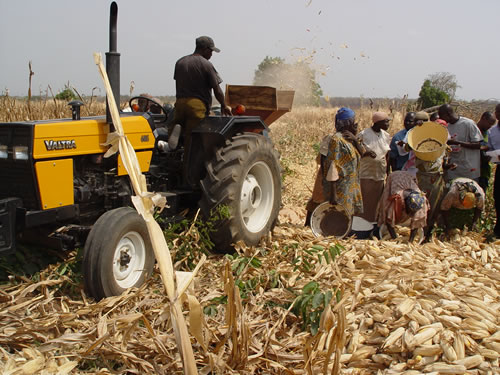The Federal Government has denied the reports by some United Nations (UN) agencies of imminent famine in Nigeria, saying there is no threat of starvation in the country.
The Minister of Agriculture and Rural Development, Chief Audu Ogbeh, made the denial when he featured at a News Agency of Nigeria (NAN) Forum in Abuja.
NAN reports that three UN agencies — Food and Agriculture Organisation, World Food Programme and International Fund for Agricultural Development –reported that Nigeria would suffer famine, food shortage and malnutrition.
Ogbeh stressed that it was virtually impossible for Nigeria to face famine or starvation because the country remained a major source of food for other African countries such as Algeria, Libya and the rest.
Cue in audio 1
“I think there’s a danger of mixing the situation in the North-East with the situation nationwide; I have seen that on CNN, starvation in Somalia and Nigeria, and then they go on to talk about the civil commotion in the North-East
“I don’t think that the rest of Nigeria is facing any threat of famine. That is not true and I think these agencies have to be a little more careful in their prognoses.
“I think there are challenges in the North-East because this is a huge part of Nigeria which for five years has not engaged in food production.
“That’s not the same in the North-West or North-Central or South-West or South-South.
“So, I think there is some degree of exaggeration and a mixture of situations, there’s no threat of starvation because we have been feeding Africa.
“People come down from Algeria to buy food in Nigeria, they come from Libya, they come from Sudan and they come from Chad.
“So, to suggest that this country that is feeding the rest of Africa is almost to go totally hungry is not true. “
Cue out audio 1
As regards malnutrition in the country, the minister conceded that this could occur as result of unbalanced food nutrients ingested by some people, wrong approach to food processing and materials used for packaging of food.
Ogbeh stressed that his ministry was trying to re-engineer food processing procedures in the country.
Cue in audio 2
“As for malnutrition, there is that possibility, the simple reason being that there is a difference between eating much and eating well.
“And there is also the problem of our diet which the ministry is beginning to work on for the first time seriously.
“Eating well means taking all the nutrients the body requires; vitamins and proteins and carbohydrates in an even balance.
“And there are other threats to health — the way we process food. We have to totally re-engineer the processing of food in this country.
“We are trying to remove import duties on stainless steel, using only stainless steel even in the grinding machines in the markets and in the grinding machines for corns and millet and what have you.
“Bits of ferrous oxides are getting into food and metal poisoning is deadly; these are the issues we are looking at.
If you ingest a lot of ferrous oxide, your kidney and liver begin to fail, there is nothing any doctor can do to help you
“And now we have brought back the three Universities of Agriculture under our ministry.
“One of the faculties of colleges we are going to insist that each of these new universities should embark upon is the School or College of Food and Health Sciences.
“We need to know more about what we eat and the effect it has on our system, so that we can spend less and less on our hospital bills; these are the issues we are looking at.
“If for instance, you use plastic cups to drink your tea or you eat `moi-moi’ (a local beans pudding) made in cellophane or a plastic container put in a micro wave.
“When you eat that kind of food, you are exposing yourself to nearly 50 possibilities of poison.
Cue out audio 2
The minister urged the citizens to use only non-toxic materials for preparing or packaging their cuisines. (NAN)




 Premier League
Premier League